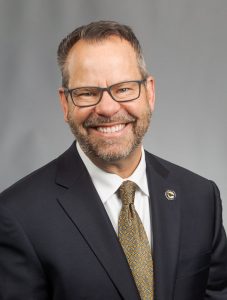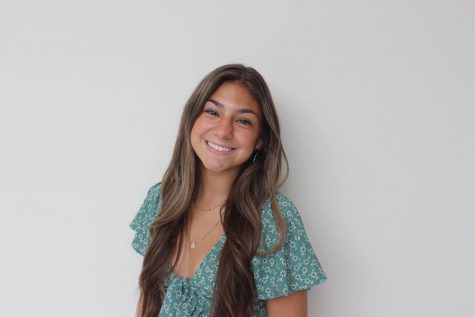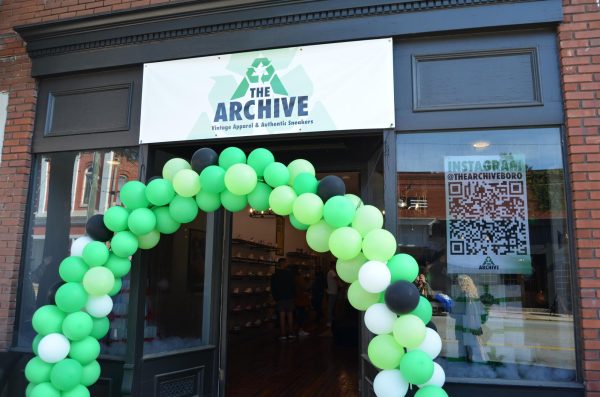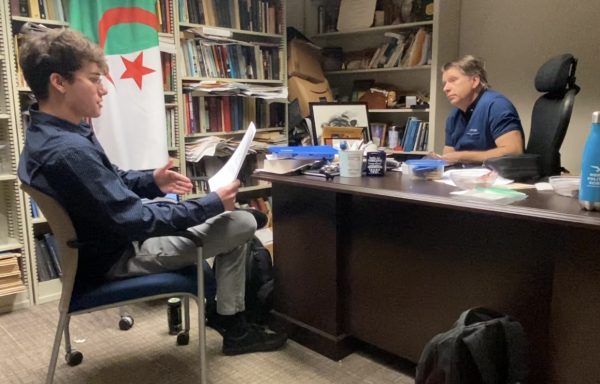President Marrero talks Enrollment, Armstrong Task Force and more

The George-Anne Inkwell, in partnership with the George-Anne, interviewed Georgia Southern’s President, Dr. Kyle Marrero, on Friday, Nov. 4, covering a variety of topics about the university, its campuses, and more.
Enrollment
Can you explain the decline in enrollment?
You have to look at a three-to-four-year window of time since I started in 2019. Then, there were 26,054 students.
We grew through the pandemic particularly with first-time freshmen coming in, we had record first-year classes in a row fall of 2020 and 2021. That and dual enrollment propelled us. We grew to 27,091 students, gaining about 1,000 students within that period.
Then everything returns from COVID-19. During those two fall semesters, fall of ‘20 and fall of ‘21, the University System of Georgia allowed us a GPA-only admit option — without ACT or SAT scores, but you could use those if you wanted to. And that minimum was a 2.6 GPA.
Then we went back to requiring test scores, but 80% of colleges and universities across the country, and many of our border states, didn’t (and still don’t) require test scores. We needed to adapt quickly, or we were going to lose the market, and so the University System of Georgia gave us the opportunity at the end of March to admit students with a minimum high school GPA of 3.2
So the top of the funnel is not a problem. Last year, we had 20,000+ applications for first-year students, which is our target number. We had 8,900 incomplete applications that either didn’t have a test score or were not engaging with us any further, and we worked through that process.
You can get a job out of high school making $35,000, $45,000, or even $50,000 a year now. So, the most significant competition I’ve ever had in my 27 years in higher education is the employment market.
We know there is a shift with high school seniors now. They are suggesting that they are not going to school this year. They will opt out for a year and/or work, so that’s all contributing to why our enrollment is down 5.86% in one year.
Construction
Any updates on the construction going on with both campuses?
Work is going on now at the Memorial College where our Student Support Services and SGA Student affairs are housed at the Armstrong campus and in the Williams’Center, the equivalent on the Statesboro campus. We will complete those probably at the end of April.
The Williams Center staff will all be moving back in May 2023. So usage-wise, those buildings will be ready in the summer and for next fall.
The new parking lot created from demolishing University Villas apartments will be done in March and that will all be permitted parking. The Indoor Practice Facility will be done in March also.
And then, Convocation Center, you’ll see construction on that plot of land south of campus beginning in December in earnest. That’ll be a two-year process to be completed in December of 2024. We’re expecting to be ready for January 2025.
On the Armstrong campus, we will begin a $2.8 million renovation on the science labs in Spring.
And then we are working on the former GBI building, which is across from Armstrong campus on the triangle property.
We finished phase one of that and will begin in phase two, so the labs will take about eight months to complete. So, by the fall of ‘23, we will complete the labs to house the Institute for Water and Health.
Armstrong Task Force
Can you expound upon the Armstrong task force and the objective behind it?
For phase one, there was an Oct.1st deadline that I received recommendations for four to six current programs that we could elevate, aligning with the market needs of the growing economy around us, Particularly in this southeast region of Georgia with a Hyundai plant coming in, we wanted to look into what those areas are and base the recommendations on data.
And then we had to look at it from a resource standpoint — what can we ramp up and be ready for fall and what can we market so John’s (Dr. John Lester) team can get out there and permeate that into the marketplace and engage students. And of course, they came back with nine programs.
We’re finalizing those now. Somewhere towards the end of next week or the following week, you’ll see a big, long email from me announcing, in essence, these are the nine baccalaureate programs, and some associate tracks that we’re going to articulate. I think you’re going to be really excited because all these programs will be able to start and finish at the Armstrong campus.
We want to make sure every student that comes to the Armstrong campus knows their path to completion from day one. For instance, if you’re going to major in engineering or pre-engineering, you can complete two years on the Armstrong campus but you’re going to have to go to the Statesboro campus to finish. However, programs like Information Technology, for example, are programs that you can start AND finish here on the Armstrong Campus.
So, part of this task force is to really ensure that every student with every program and we’re expanding those that you’re going to be able to complete here and are going to know exactly what that is on that track and very clear so they can make informed decisions and not be surprised on that way.
There will also be new programs coming out of this. That will be the phase two part of it. Over the next six months will be a three-to-five-year plan that even expands into professional certifications, graduate programs, and other areas that we know have great opportunities in this marketplace.
And why are we focusing on that? That’s a fair question. I’ve gotten this particularly from the Hinesville and Statesboro communities. Are you just focusing on Savannah? Well, we’ve underperformed in Savannah. We need to do a better job..
Communication
Why has communication been off? What are you all doing to address communication?
Right from the department level, that has to be immediate priority. The communication has to be consistent from your advisor to the department. That’s what we talked about, ensuring as the curriculum is mapped out, every single student that comes in should go “okay,here’s how I finish this in four years.”
And this is what we have in those curriculum maps. Every department has that. But are they ensuring that promising students can finish in the four years here (Armstrong Campus)? And if there are changes, are we actively communicating that and giving the reasons why, so it’s not a surprise? I can tell you we’re going to do a better job at that. And so, you can hold me accountable on it.
ACT and SAT Requirements
When do you expect the ACT and SAT tests to be required again for admission and what are the score requirements?
One that’s not my decision, that’s the University System of Georgia’s decision in terms of what they do and what they allow.
They’ve allowed us this one more year for an opportunity to make sure we’re competitive in the marketplace and then they were really going to assess the data. How have our students done?
Because the COVID years are not a good indicator. We have record freshman-to-sophomore retention rates; we have record graduation rates in the history of the institution. We’re still seeing record four- and six-year graduation rates that are higher than anyone else in our sector in the comprehensive sector.
But our record retention number of 79% of freshmen-to-sophomore is a really complicated definition. You have to complete 30 hours to fit this definition. So you could take 27 hours your freshman year, come back the next year as a sophomore, but you would not be counted in terms of first year retention, according to the national IPEDS (Integrated Postsecondary Education Data System) data.
During COVID, our fall of ‘20 class and our fall of ‘21 class didn’t retain at the same level — they retained at 72%. So that’s a lower level of retention. So you can understand from a system perspective, what’s the right spot if we admit with a 2.6 GPA minimum? Now for the first time admissions requirements are set at a 3.2 GPA minimum. Let’s see how these students perform. Is this the right place for them to be with all the support services we put around them with advising, with supplemental tutoring, etc? If we can show this fall semester retains at our pre COVID levels, I think we have a really good case of the value of ACT and SAT scores.
So, I’d say the jury’s out still. The board has given us a test score waiver for one more year. The data, and our student performance and their success, will help tell a story. It will help us make more informed decisions and for the University System Board of Regents to make that decision on whether there’s a policy change.
That’s a really long answer to say, I don’t know yet.
Tuition
Is tuition keeping up with inflation?
No. There’s my blunt answer. We’ve raised tuition once in five years. It’s not in my purview to raise tuition. That’s the Board of Regents of the University System of Georgia. But we all have been conscious of the cost to students’ accessibility affordability.
In fact, last year, the cost for college in Georgia was reduced for the first time in the 27 years that I’ve been in higher education. It’s cheaper for students this year than it was the year before, with a special institutional fee completely eliminated. That’s $290 a semester for Statesboro students. It was $150 for Armstrong students.
Tuition is tough in that, from a cost basis and affordability standpoint, what’s that sweet spot? Inflation was, 2.75% or 3% a year, and now it’s 11% or 12%. And so, the cost of goods, services, etc. are going up. But we have found efficiencies in our operations, we’ve done robotic process optimization, we’re finding ways in which to not need to spend as much money for the operations of a university with 25,500 students and 3000 employees.
And so, I’m proud of the fact that we have not raised tuition except once in the last five years. I’m proud of that. And it’s our job to continue to find efficiencies to keep those costs low.
Be sure to check your student inbox and our website to stay up to date with the latest Armstrong news!

An award-winning senior Communications major from Atlanta, Georgia, Jabari is passionate about bringing diverse perspectives to the news. He has been with...

Vanessa Countryman is the Editor-in-Chief of The George-Anne. She is a Junior majoring in Multimedia Journalism and has been with the George-Anne...








